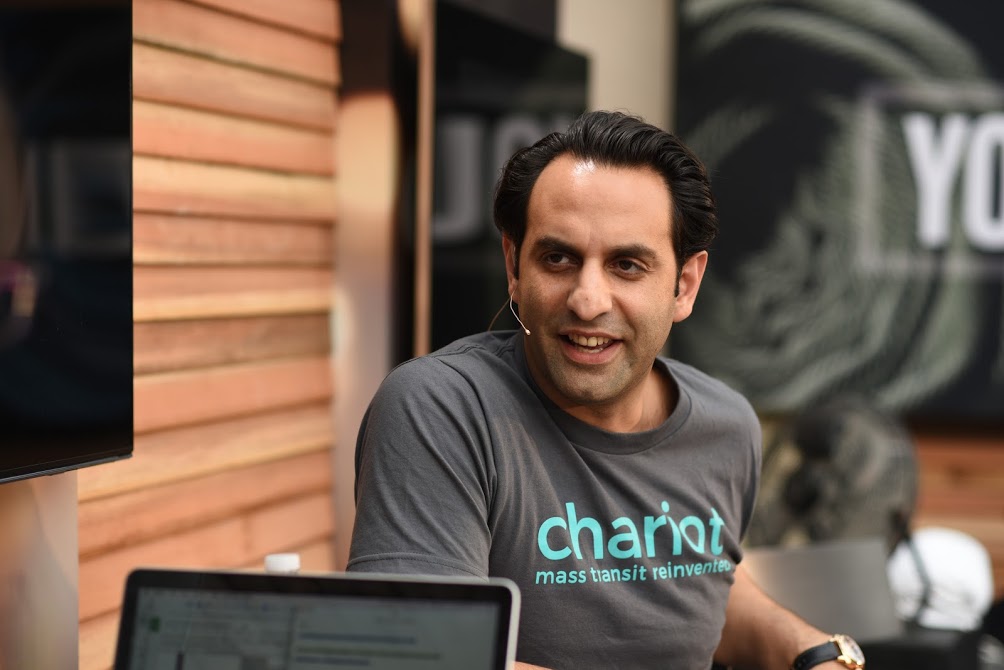 BIG DATA
BIG DATA
 BIG DATA
BIG DATA
 BIG DATA
BIG DATA
Is personal mobility poised for disruption? Innovative technologies, such as artificial intelligence and the Internet of Things, are transforming the automotive industry with autonomous vehicles, connected cars and crowdsourced ride-sharing, creating a new transportation ecosystem.
Chariot Transit Inc., a crowdsourced transportation provider located in San Francisco and Austin, is part of Ford Smart Mobility LLC and an integral part of its mobility strategy.
“[AI] is in the future, and it’s not too distant from where we are right now,” said Ali Vahabzadeh (pictured), founder and chief executive officer of Chariot Transit.
Joining John Furrier (@furrier), host of theCUBE, SiliconANGLE Media’s mobile live streaming studio, at the South by Southwest event held in Austin, Texas, Vahabzadeh discussed Ford’s incredible resources and vision for future mobility and the role AI will play. (* Disclosure below.)
Ali Vahabzadeh is theCUBE’s Guest of the Week.
According to IHS Automotive, the pace of growth in the market is increasing due to automakers’ and technology companies’ significant investments into new mobility solutions, such as ride-sharing and autonomous and connected cars.
The future looks bright for autonomous vehicles. However, there is a need for standardization and refining learning algorithms across the industry in order to gain acceptance with regulators and society, according to Vahabzadeh.
AI and machine learning will also drive choices in personal mobility as well. The pay-per-use consumption model, which began with companies like Zipcar, Uber and Lyft are also moving to an autonomous model. This type of transportation is popular with Millennials, Gen Y and city dwellers due to the expense involved in owning a car. Most people in these groups also believe that walking or public transportation fit into their lifestyle.
An APTA/TCRP study reports that millennials are expecting more from personal mobility over the next 10 years, including more reliable systems, real-time updates, Wi-Fi or 4G, and a more user-friendly and intuitive travel experience. All this will require a reworked infrastructure, which depends on AI to cultivate and develop algorithms to improve customer participation, according to Vahabzadeh.
“Ford wants to be a mobility company, [and] with this thing we have in our pockets, a phone, it provides a tremendous amount of data about us … people trying to get from point A to point B,” he said. Harnessing that data will empower Chariot Transit to make intelligent and efficient choices about dispatching the company’s vehicles.
Ford’s latest response to the latest market trends, was a $1-billion-dollar investment over the next five years in Argo AI, an AI company. Ford is using this technology to expand on its autonomous vehicle promise by drawing on the robotics experience and artificial intelligence software. Founded by former Google and Uber executives, this technology will also benefit Ford Smart Mobility LLC in areas such as ride sharing and ride-hailing.
Transportation in the future will rely on the customer experience, and here is another opportunity for Chariot Transit and Ford to use AI to increase the popularity of ride-sharing by using the data captured by riders to enhance their commutes.
Vahabzadeh envisions virtual reality and entertainment options to make the commute more enjoyable, along with the possibility for social or professional networking opportunities. “Perhaps your next date is on board,” he said.
AI will elevate data collection and provide Chariot Transit more information about passenger’s preferences and offer the company more opportunities to add services. Vahabzadeh noted that AI could help to create a tool that suggests places to go and things to do and then allow people to find the right Chariot Transit to board to go to their destination.
Vahabzadeh said that the thought of running more efficient routes and networks enhanced by AI would not only improve the human experience, but it will help the environment. “I think AI is going to take cars off the street,” he said, anticipating parking lots converted into lower-income housing and public parks.
AI promises a great deal to the automotive industry, and the industry is betting big on the technology. IHS Automotive indicated there would be nearly 76 million vehicles with some level of autonomy sold by 2035.
However, as mobility transforms, it is necessary for converged infrastructure and edge networking to advance the real-time communications and decision-making on behalf of the vehicle. The reworked infrastructure necessitates AI to train algorithms for proper decision-making capabilities, according to Vahabzadeh.
Watch the complete video interview below, and be sure to check out more of SiliconANGLE’s and theCUBE’s coverage of the South by Southwest. (* Disclosure: Intel sponsors some SXSW segments on SiliconANGLE Media’s theCUBE. Neither Intel nor other sponsors have editorial control over content on theCUBE or SiliconANGLE.)
THANK YOU